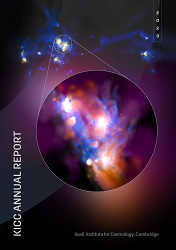
Submitted by S. Brereton on Thu, 10/07/2025 - 08:57
Astronomers want to unlock the secrets of the 'Cosmic Dawn' by sending a miniature spacecraft to listen out for an "ancient whisper" on the far side of the Moon.
The proposed mission will study the very early universe, right after the Big Bang, when it was still quite dark and empty before the first stars and galaxies appeared.
But to probe the cosmic 'Dark Ages', silence is essential. And Earth is a very 'noisy' place for radio signals, with interference from our atmosphere and all our electronics.
"It's like trying to hear that whisper while a loud concert is playing next door," said Dr Eloy de Lera Acedo, head of Cavendish Radio Astronomy and Cosmology at the University of Cambridge.
"This makes it really hard to pick up those faint signals from billions of years ago. To detect a special radio signal that comes from hydrogen – the first, most basic and most abundant chemical element – in the early universe, we need it to be quiet.
"That's why we're proposing to send a small satellite to orbit the Moon and detect a signal which could hold clues about how everything began and how structures like galaxies eventually formed.
Read more about the project here


